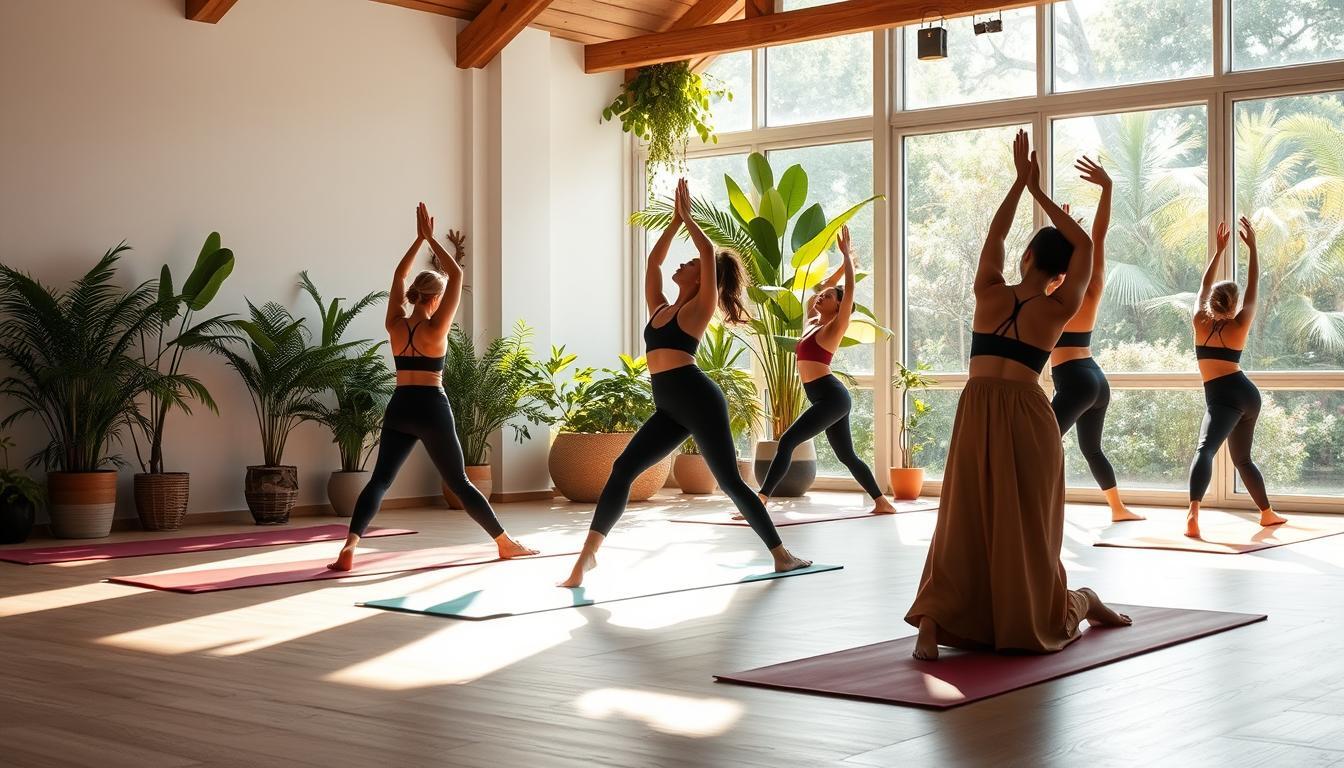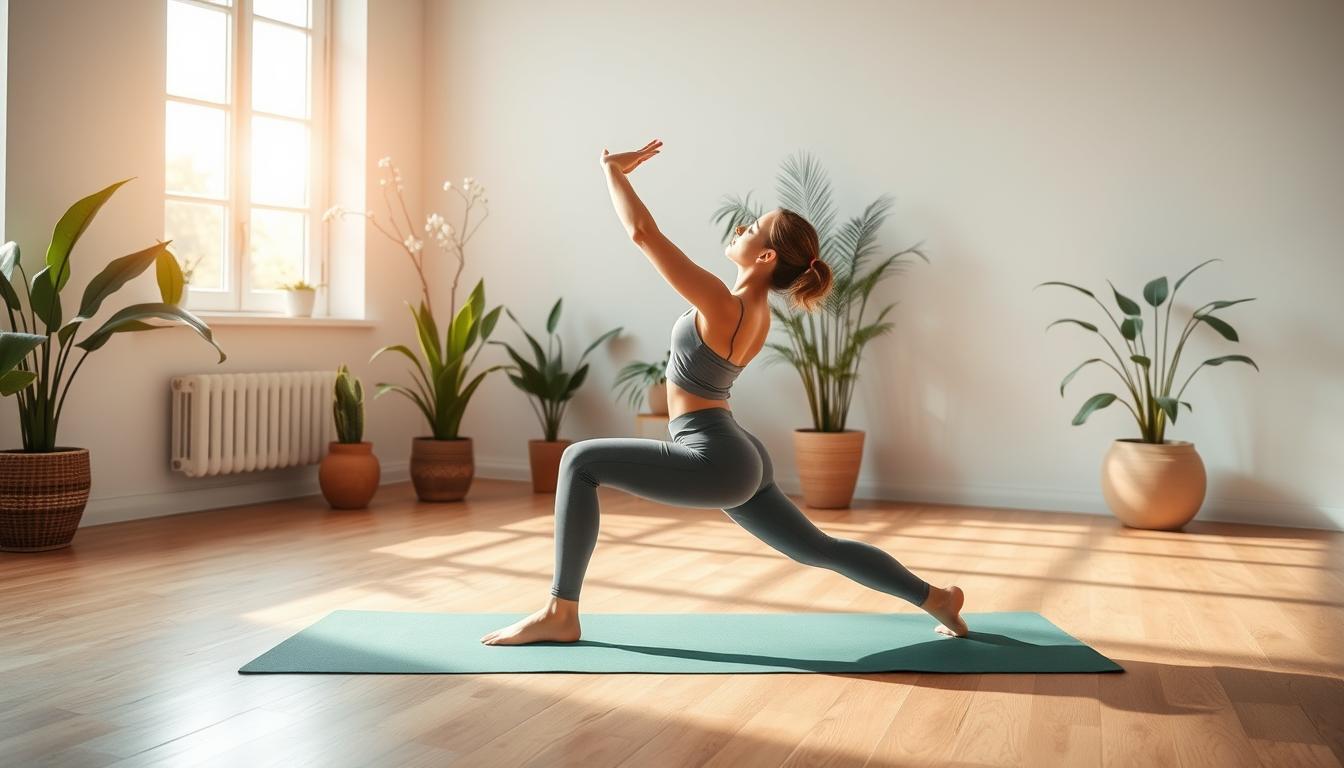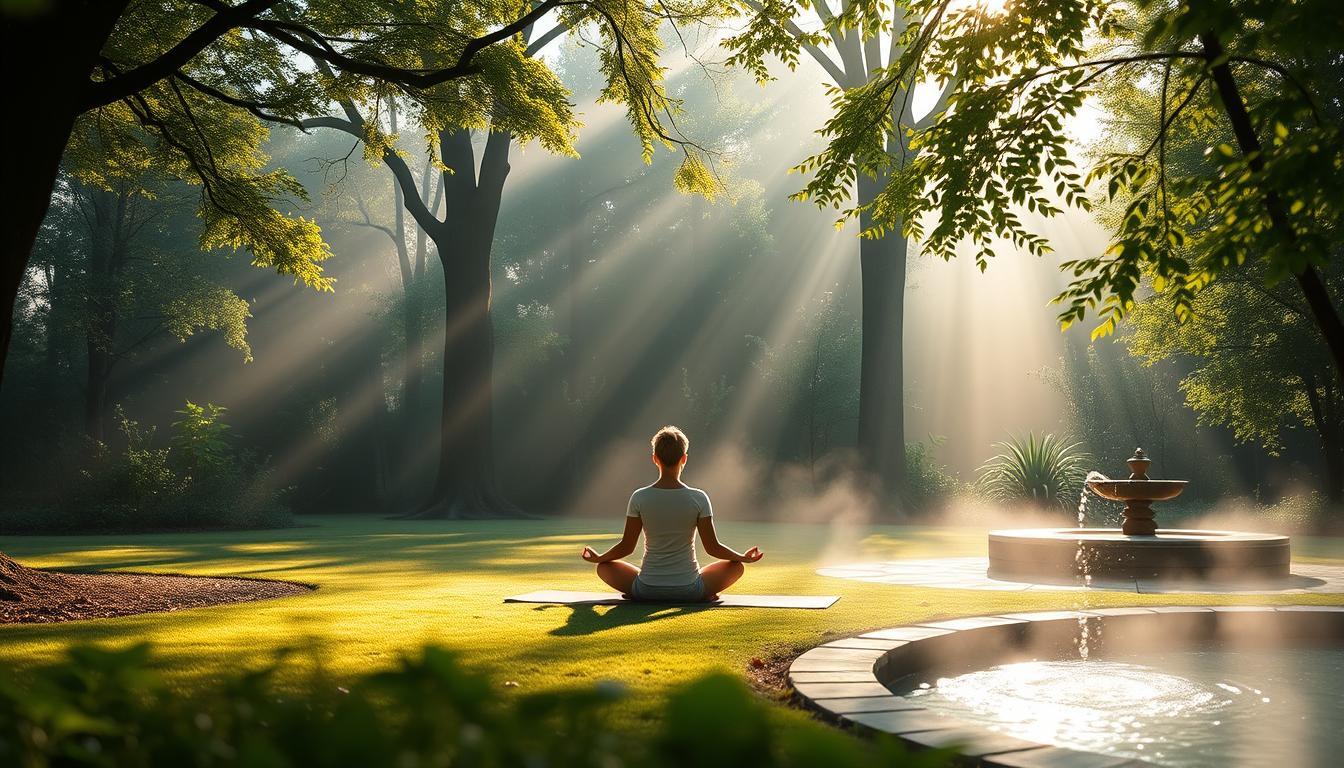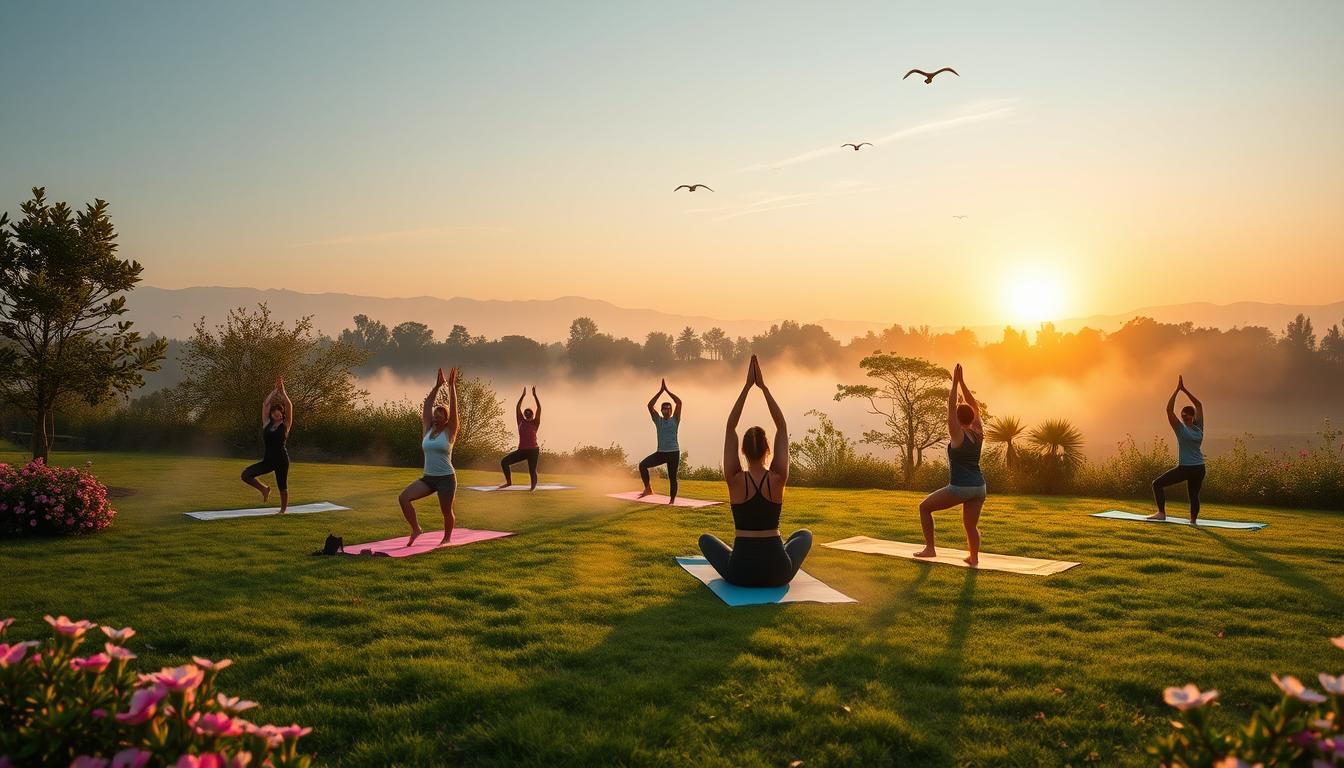Start your day with a morning yoga practice. It brings many benefits for your body, mind, and spirit. As the sun rises, begin a journey that refreshes and energizes you. This yoga flow helps you stretch, strengthen, and shine, making your day more mindful and productive.
Key Takeaways:
- Start your day with a revitalizing yoga flow to stretch and strengthen your body
- Boost your energy levels and improve mental clarity with a morning yoga practice
- Discover the physical, mental, and emotional benefits of a consistent morning yoga routine
- Learn essential tips to prepare for and seamlessly integrate a morning yoga flow into your daily routine
- Explore a step-by-step morning yoga sequence to energize and invigorate your body and mind
Benefits of Starting Your Day with Morning Yoga
Starting your day with morning yoga can greatly improve your well-being. Just a few minutes of this practice can bring many benefits. These benefits nourish your body, mind, and spirit. Let’s look at how morning yoga can make your life better.
Physical Benefits for Your Body
Morning yoga makes your body strong and flexible. It increases your flexibility, range of motion, and posture. You’ll also get stronger and more energetic, ready for a busy day.
Mental and Emotional Advantages
Morning yoga also benefits your mind and emotions. It teaches you to be mindful, improving your focus, clarity, and inner peace. As you practice, stress and anxiety fade away, leaving you refreshed and centered.
Energy Level Improvements
Morning yoga boosts your energy levels all day. It combines physical activity, breath work, and mental calm. This mix makes you feel invigorated and ready to face the day’s tasks. You’ll be more productive, creative, and full of life.
“Yoga is not just a workout, it’s a work-in. And this is the point of spiritual practice; to make us teachable, to open up our hearts and focus our energy to receive the teachings.” – Rolf Gates
Essential Preparation Tips for Your Morning Practice
Starting your day with yoga can change your life. But, you need to prepare well. Get the right yoga mat essentials and create a peaceful pre-yoga ritual. These tips will help you enjoy your morning yoga practice more.
First, make a special yoga area at home. Pick a quiet spot with good light and few distractions. Make sure you have enough space to move. Add things like candles, plants, or art to make it calm.
Then, get your yoga preparation ready. Collect your mat, a blanket, blocks, straps, and any other props. Having these things ready makes it easy to start your practice.
- Wear comfy, breathable yoga clothing that lets you move freely.
- Start with a morning routine that gets you ready, like stretching, meditation, or journaling.
- Drink water or herbal tea to stay hydrated.
- Think about what you want to focus on in your practice. This can make your experience deeper.
Preparing your body and mind well sets you up for a great morning yoga practice. See this time as a chance to connect with yourself and begin your day with purpose and calm.
Morning Yoga Flow: Stretch, Strengthen, and Shine
Starting your day with yoga is a journey of self-discovery. It begins with setting your intention and creating the right space. We’ll cover the key steps to make your yoga session both quick and meaningful.
Setting Your Intention
Before you start, take a moment to think about your goals for the day. What do you hope to cultivate or release during your practice? It could be inner peace, more energy, or a closer bond with your body. Having a clear intention adds purpose and focus to your practice.
Creating the Right Environment
Creating a yoga-friendly space at home can boost your morning routine. Find a quiet, well-lit spot without distractions. Add elements like candles, crystals, or art to enhance your yoga intention setting. A yoga space setup that suits you can turn your practice into a special ritual.
Time Management Tips
With our busy lives, a time-efficient yoga practice is crucial. Try shorter but powerful sequences. Add breathwork and meditation to your routine. This way, you can enjoy yoga without losing your morning time.
By setting your intention, creating a calm space, and managing your time well, you’ll start your day with a fulfilling yoga practice.
“Yoga is not just about the body, it’s about the mind and it’s about finding that balance and calm within yourself.”
– Carrie-Anne Moss
Warming Up Your Body: Initial Poses and Movements
Starting your morning yoga with a warm-up is key. It gets your body ready for deeper stretches and exercises. These yoga warm-up exercises and pre-yoga movements make your transition smooth. They boost flexibility, circulation, and comfort in your practice.
Begin by standing tall in Mountain Pose. Take a few deep breaths to center yourself. Roll your shoulders back and down. Then, gently tilt your head from side to side to release neck tension.
Try these gentle yoga stretches to warm up your major muscles:
- Arm Circles: Raise your arms out to the sides and make small, controlled circles forward and backward.
- Torso Twists: Inhale as you reach your arms overhead, then exhale as you twist your torso to the right and left.
- Hip Circles: Stand with your feet hip-width apart and gently circle your hips in both directions.
These simple, yet effective, pre-yoga movements get your blood flowing. They prepare your body for deeper stretches and strengthening poses. Move mindfully, listening to your body and adjusting as needed. With a thorough warm-up, you’ll be ready to dive into your morning yoga flow with confidence and ease.
Sun Salutation Sequence for Energy Activation
Surya Namaskar, or the Sun Salutation sequence, is a powerful yoga practice. It energizes your body and mind in the morning. This dynamic flow awakens your senses, improves circulation, and boosts your well-being.
Traditional Surya Namaskar Steps
The classic Surya Namaskar has 12 synchronized movements, each with a specific breath. These steps include:
- Standing in Mountain Pose (Tadasana)
- Raising the arms overhead (Urdhva Hastasana)
- Forward Fold (Uttanasana)
- Stepping back into Plank Pose (Chaturanga Dandasana)
- Lowering into Chaturanga Dandasana
- Upward-Facing Dog (Urdhva Mukha Svanasana)
- Downward-Facing Dog (Adho Mukha Svanasana)
- Stepping forward into Forward Fold (Uttanasana)
- Rising up into Raised Arms (Urdhva Hastasana)
- Returning to Mountain Pose (Tadasana)
Modifications for Beginners
If you’re new to yoga or want to ease into Surya Namaskar, try these modifications. Start by doing the poses without the vinyasa transitions. Or, simplify the movements to focus on your breath and alignment.
Advanced Variations
For those with more experience, Surya Namaskar can be made more challenging. You can add arm balances, inversions, and harder transitions. Try these advanced options to deepen your practice and challenge yourself.
Remember, finding the right balance is key to a successful morning yoga routine. Try different variations and modifications to see what works best for you and your energy levels.
Core-Strengthening Poses for Morning Practice
Start your day with a yoga routine that focuses on your core. Adding core-strengthening poses to your morning routine can make you more stable and improve your posture. These poses will also make your body stronger. Let’s look at some effective poses that will make you feel energized and strong all day.
Boat Pose (Navasana)
This classic pose works your core by lifting your legs and torso off the mat. It forms a “V” shape with your body. Begin seated, then lift your feet off the floor, balancing on your sit bones. Hold for a few breaths, focusing on your breath and keeping your body aligned.
Plank Pose (Chaturanga Dandasana)
Plank pose is great for building core strength yoga. Start in a high pushup position, keeping your core muscles tight. Make sure your body is straight from heels to head. Avoid letting your hips or belly sag. Hold for a few breaths, breathing deeply and keeping your core tight.
Dolphin Pose (Ardha Pincha Mayurasana)
This pose targets your yoga core exercises and stretches your shoulders and hamstrings. Start on all fours, then lift your hips up and back into a forearm plank. Keep your body straight, avoiding arching your back too much.
Adding these abdominal yoga poses to your morning routine can make your core strong and stable. This improves your physical performance and overall well-being. Always listen to your body, adjust poses as needed, and practice with mindfulness and patience.
| Yoga Pose | Primary Muscle Groups Targeted | Benefits |
|---|---|---|
| Boat Pose (Navasana) | Abdominal muscles, hip flexors | Strengthens the core, improves balance and stability |
| Plank Pose (Chaturanga Dandasana) | Abdominal muscles, arm and shoulder muscles | Builds upper body and core strength, improves posture |
| Dolphin Pose (Ardha Pincha Mayurasana) | Abdominal muscles, shoulders, hamstrings | Strengthens the core, stretches the shoulders and hamstrings |
“A strong core is the foundation for all movement, whether it’s doing a handstand or jumping out of bed in the morning.”
Standing Poses to Build Strength and Balance
Start your day with yoga poses that boost your strength and balance. These poses not only make your muscles stronger. They also help you feel more balanced and ready to face the day.
Mountain Pose Variations
Begin with the basic Mountain Pose (Tadasana). Try different versions of this pose to work on different muscles and feel more grounded. Try Raised-Arm Mountain Pose, Standing Backbend, and Standing Forward Fold to stretch, strengthen, and balance your body.
Warrior Series Guidance
- Move into the strong Warrior Pose (Virabhadrasana) series. It makes your legs stronger, opens your hips, and builds determination.
- Start with Warrior I, then do Warrior II and Reverse Warrior. Focus on keeping your body straight and breathing well.
- For more of a challenge, try Crescent Lunge and Goddess Pose variations. They work your core and improve your balance.
Adding these yoga standing poses and balance yoga poses to your morning routine will give you more Warrior pose variations strength and stability. You’ll feel empowered to tackle the day.
Gentle Backbends for Spinal Health
Keeping your spine healthy is key to feeling good. Gentle yoga backbends are a great way to do this. They help your spine stay flexible and strengthen the muscles that support it.
Poses like Cobra Pose (Bhujangasana) and Camel Pose (Ustrasana) open your chest and expand your spine. This makes your back more mobile and strong. They’re especially good for people who sit a lot, as they help counteract the effects of sitting.
- Cobra Pose (Bhujangasana): Lie on your stomach with your palms on the mat beside your chest. Lift your head, chest, and torso, keeping your elbows in. Make sure your lower back is supported.
- Camel Pose (Ustrasana): Kneel on the mat with your knees apart. Place your hands on your lower back and slowly arch your back. Lift your chest and hips up, keeping your thighs straight.
Always listen to your body and adjust the backbend as needed. Slowly getting better and practicing regularly are important. This way, you’ll get the most out of these yoga backbends and keep your spine strong and healthy.
“The spine is the royal highway of the body. Keep it in good repair and the whole system will function better.”
Forward Folds and Hip Openers
Adding forward folds and hip openers to your morning yoga can do wonders. They boost flexibility, ease tension, and improve spinal health. These poses stretch your hamstrings, hips, and lower back, making you feel fresh and ready for the day.
Safe Alignment Tips
It’s key to align properly in forward folds and hip openers to avoid injury and get the most benefits. Here are some tips:
- Engage your core muscles to support your spine
- Bend your knees if needed to maintain a neutral spine
- Avoid rounding your back; focus on hinging at the hips
- Use props like blocks or straps to make the poses more accessible
Progressive Stretching Techniques
To deepen your forward folds and hip openers, try progressive stretching. This means slowly increasing the stretch and intensity over time. Here are some ways to do it:
- Holding the poses for longer durations
- Exploring variations with wider or narrower stances
- Incorporating dynamic movements within the poses
- Using resistance bands or other props to enhance the stretch
Always listen to your body and respect your current flexibility. Don’t push too hard, as it can cause injury. With patience and dedication, you’ll see your yoga forward folds and hip opening poses improve over time.
| Pose | Benefits | Alignment Tips |
|---|---|---|
| Standing Forward Fold (Uttanasana) | Stretches the hamstrings, calves, and spine | Engage your core, bend your knees if needed |
| Wide-Legged Forward Fold (Prasarita Padottanasana) | Opens the hips and groin while lengthening the spine | Keep your knees slightly bent, fold from the hips |
| Seated Forward Fold (Paschimottanasana) | Stretches the hamstrings, lower back, and shoulders | Use a strap behind your thighs to deepen the fold |
By using these yoga alignment tips and progressive stretching techniques in your morning yoga, you’ll unlock the full benefits of forward folds and hip openers. This will enhance your flexibility and overall well-being.
Breathing Techniques for Morning Energy
Start your day with a boost by adding energizing breath work to your morning yoga. Pranayama, the ancient yogic art of breath control, is a powerful way to begin with energy. Try these yoga breathing techniques for a burst of morning energy and clear thinking.
Nadi Shodhana: Alternate Nostril Breathing
This pranayama exercise balances your brain, bringing calm and energy. Close one nostril and breathe in through the other. Then, switch for the exhale. Keep this rhythm going, letting your breath flow smoothly.
Kapalbhati: Skull-Shining Breath
Wake up your inner fire with Kapalbhati. This quick, strong breathing wakes up your belly and energizes you. Breathe out hard through your nose, letting in naturally.
Ujjayi: Victorious Breath
Ujjayi, or “ocean breath,” soothes your mind and boosts energy. As you breathe in and out, slightly close your throat. Keep your breathing steady and smooth.
Add these pranayama exercises to your morning yoga for a powerful start. Experience the energy boost of yoga breathing techniques and kick off your day with energy.
Cool-Down Sequence and Final Relaxation
As your morning yoga practice ends, it’s key to guide your body into a cool-down sequence. This helps your muscles release the tension from the active poses. It prepares you for deep relaxation.
Transitional Poses
Start with gentler, restorative poses that stretch and soothe your body. Think child’s pose, reclined butterfly, or a simple seated forward fold. Take your time, focusing on your breath and letting your body settle.
Savasana Guidelines
Then, move into Savasana, or corpse pose. Lie down on your mat, letting the ground support your body. Close your eyes and focus on your breath, letting go of tension with each exhale. Stay in Savasana for 5-10 minutes, enjoying complete stillness before returning to the present.
FAQ
What are the key benefits of starting your day with a morning yoga practice?
Morning yoga boosts physical flexibility and mental clarity. It also balances emotions and boosts energy all day.
How can I effectively prepare for my morning yoga routine?
Prepare by setting up a yoga space and wearing comfy clothes. Don’t forget your yoga mat, blocks, or straps.
What is the Sun Salutation sequence, and how can it help activate my energy?
Sun Salutations energize your body and mind. They involve standing, bending forward, and backbending poses done smoothly.
What core-strengthening yoga poses should I include in my morning practice?
Include Plank, Side Plank, Boat Pose, and Hollow Hold. These poses strengthen your core and improve stability.
How can I safely and effectively incorporate backbends into my morning yoga flow?
Start with Cobra, Upward-Facing Dog, and Camel Pose. These poses enhance spinal flexibility and back strength. Focus on alignment and avoid overstretching.
What breathing techniques can I use to boost my energy levels in the morning?
Try Kapalabhati (Skull Shining Breath) and Breath of Fire. These pranayama exercises increase oxygen and energize you.




